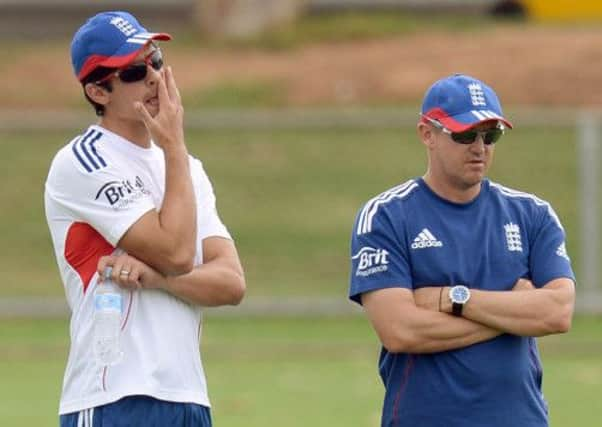Flower and Cook refuse to recognise England’s ills


There have been bad tours before – one could list half a dozen – but none in which England have succumbed so feebly and completely, none, surely in which England have been all-out in every innings.
Now that it’s over, some are quick to say that the writing has been on the wall for some time: Mene Mene Tekel Upharsin. “Thou are weighed in the balance and found wanting”. The summer series was closer than England’s 3-0 margin of victory suggested, and it was a long time since England had made 400 in the first innings of a Test. On the other hand, no one, I think, foresaw the team’s complete disintegration or the really pitiful batting. There was only one English century in the five Tests and it was scored by young Ben Stokes, whom few had expected to feature in the Test side.
Advertisement
Hide AdAdvertisement
Hide AdJonathan Trott and Graeme Swann went before the series was over, both, if in different ways, broken men. By the end most of the senior players – Cook, Pietersen, Bell, Prior, and Anderson – seemed mentally at sea and demoralised. One might make an exception of Ian Bell. Though he got out a couple of times to horrible shots, even in his last innings when there was no hope of saving anything but honour, he was batting with apparent confidence till he got out playing a shot that had brought him lots of runs during his splendid summer in England. So he may recover as, indeed, he has done from bad spells, and from being dropped, before.
The defeat could scarcely have been more complete. Yet, in every Test, there were sessions when England were on top, for, at times, Australia’s upper order were very shaky themselves. Yet they were always allowed off the hook. England never found a way to bowl to Brad Haddin. This was partly because captain Alastair Cook’s field settings, no doubt discussed in advance with the coach, Andy Flower, were naïve. You want to set a containing field to a player like Brad Haddin and bowl off-stump or just outside. Throughout the series, the Australians bowled to a plan, reflected in Michael Clarke’s field-settings, tailored to individual English batsmen. In contrast Cook’s fields offered lots of gaps and easy singles, twos and threes.
Dropped catches lose matches is one of the oldest and truest cricket sayings and England proved its truth in every game. If you are struggling to take ten wickets, it’s a pity to have to take twelve or 13, as it were. David Warner, Clarke and Haddin were all dropped before going on to make big scores. So Australia not only batted and bowled better than England, they fielded and caught better.
One has the impression that England had become complacent, too many players assured of their position in the side. Dropping a player sometimes does him good. It tests his character. Bell passed that test after he was dropped in the West Indies and had to watch his replacement Ravi Bopara score centuries against a mediocre attack. More pertinently to this Ashes series, Mitchell Johnson, having been discarded by the selectors, and mocked by English crowds, returned to Test cricket bowling faster and more accurately than before.
There have to be changes. Flower and Cook want to continue in their present roles. This suggests they think a bit of patching is all that is needed, or that they believe the series the equivalent of a bad day at the office. Refusing to leave a sinking ship may show character, but it may be no more than an obstinate refusal to admit that things are fundamentally wrong. Too many analysts, too little willingness on the part of the players to think for themselves. Young Stokes brought freshness to the team partly, perhaps, because he was an outsider, rather than a member of Club England. Flower and Cook must also take some responsibility for the selection of the touring party, with three tall fast bowlers, none of whom justified being preferred to, say, Graham Onions. Discarding Nick Compton so abruptly last summer also looks like a mistake now. Sadly, none of the three young Yorkshiremen, Joe Root, Jonny Bairstow and Gary Ballance, took their chance. Root did play one very good innings of 87 and will come again. I’m less sure about the other two.
What was shocking for older watchers was the inability of the English batsmen to knuckle down and play a long match-saving innings. The explanation that they play too much one-day and T20 stuff is tempting but unconvincing. After all, the same is true of every Test team. They all play lots of one-day cricket, but some of them can play proper Test cricket too.
English cricket needs to take a look at itself. The first thing the ECB should do is revise its calendar so that the first-class county season isn’t shunted to April, May and September, when the ball moves about so that bowlers get easy wickets, and few batsmen play long innings. Unless there is a fair amount of first-class cricket in June, July and August, England will not produce batsmen capable of building an innings or bowlers who learn to take wickets in unfavourable conditions. And they certainly won’t find a Test-class spinner to follow Graeme Swann.